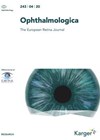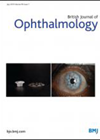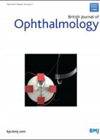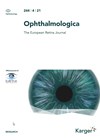You searched for "oedema"
High dose (2.5mg) bevacizumab for postradiation cystoid macular oedema
1 April 2017
| Yamini Krishna
|
EYE - Pathology, EYE - Oncology
|
Anti-VEGF, Cystoid macular edema, Melanoma, Radiation damage, Radiotherapy, Tumor
The authors present a retrospective, interventional case series investigating the efficacy of high dose (2.5mg/0.1ml) intravitreal bevacizumab in the treatment of persistent postradiation (Iodine-125 plaque brachytherapy for uveal melanoma) cystoid macular oedema (CME). Persistent CME was defined as increased or...
Steroid implants in the treatment of post-epiretinal membrane peel macular oedema
1 February 2018
| Kurt Spiteri Cornish
|
EYE - Vitreo-Retinal
This is a retrospective review of 39 eyes of 37 patients treated with Ozurdex® (intravitreal dexamethasone implant) for persistent post-operative cystoid macular oedema (CMO) following vitrectomy and idiopathic epiretinal membrane (ERM) peeling. The 0.7mg implant was injected in each eye...
Rebound phenomenon after IVT triamcinolone acetonide for macular oedema
7 April 2021
| Sofia Rokerya
|
EYE - Vitreo-Retinal
In this retrospective study, the authors report the rebound phenomenon after intravitreal triamcinolone acetonide (IVTA) injection for macular oedema secondary to diabetic retinopathy (DR) and central (CRVO) or branch retinal vein occlusion (BRVO). The incidence of a rebound phenomenon was...
OCTA in diabetic macular oedema treated with intravitreal aflibercept (DOCTA Study)
3 April 2024
| Sofia Rokerya
|
EYE - Vitreo-Retinal
Central vision loss due to diabetic macular oedema (DME) can be attributed not only to presence of the macular oedema itself but also, in some cases, to alterations of the foveal avascular zone (FAZ). The DOCTA trial was a longitudinal,...
Retinitis pigmentosa (RP) associated cystoid macular oedema (CMO)
1 October 2017
| Jonathan Chan
|
EYE - Vitreo-Retinal
This is a review article from two units in the UK and Australia, highlighting the supporting evidence of possible pathogenesis and treatment modalities of CMO in RP. The authors proposed that the likely mechanisms for RP-CMO involved the breakdown of...
OCT biomarkers in asymmetric anti-VEGF response in bilateral diabetic macular oedema
1 December 2021
| Su Young
|
EYE - Vitreo-Retinal
|
Diabetic macular edema, aflibercept, optical coherence tomography, predictive, ranibizumab
This study aimed to identify optical coherence tomography (OCT) biomarkers for predicting response to anti-VEGF treatment in diabetic macular oedema (DMO). Bilateral DMO patients with asymmetric response to a loading dose of anti-VEGF (ranibizumab / aflibercept) treatment were retrospectively studied....
Intravitreal bevacizumab vs. ranibizumab in the treatment of macular oedema due to BRVO
This is a randomised, prospective, non-inferiority trial of 75 patients with macular oedema due to a branch retinal vein occlusion (BRVO) who received intravitreal injections of ranibizumab or bevacizumab after 1:1 block randomisation. This study is to measure the difference...Pathophysiology of diabetic macular oedema: why combination therapy may be better
1 October 2015
| Winfried MK Amoaku
|
EYE - Vitreo-Retinal
The prevalence of diabetes has continued to increase over the years. It is currently estimated that there are 382 million with diabetes worldwide in 2013, and that this figure is expected to rise to 592 million by 2035 [1]. In...
Usefulness of gonioscopy to investigate cause of corneal oedema after cataract surgery
A 72-year-old man with ocular hypertension presented three months after routine right phacoemulsification and toric intraocular lens (IOL) implantation with a two-week history of an irritated right eye and a sudden deterioration in right vision. His preoperative spherical equivalence was...Efficacy of intravitreal dexamethasone implant in patients with persistent macular oedema
1 December 2014
| Sofia Rokerya
|
EYE - Vitreo-Retinal
Chronic cystoid macular oedema (CME) can develop secondary to various pathologies such as diabetic maculopathy, retinal vein occlusion and uveitis. It can cause significant visual impairment and macular damage. The therapeutic effect of corticosteroids in CME is through one or...
Effectiveness and Safety of Dexamethasone implants for post surgical macular oedema including Irvine-gass syndrome
1 April 2018
| Jonathan Chan
|
EYE - Vitreo-Retinal
This is a retrospective, multicentre, uncontrolled, consecutive case series from Lyon, France between April 20111 to June 2014, with minimum of one year follow-up. The clinical features including the best corrected acuity (BCVA), central subfield macular thickness (CSMT) and intraocular...
Intravitreal dexamethasone in diabetic macular oedema (DMO) - enhancing the response to anti-VEGF in non- or poor responders
3 February 2023
| Sofia Rokerya
|
EYE - Vitreo-Retinal
|
Aflibercept, Anti-VEGF, Dexamethasone implant, Diabetic macular oedema, Persistent, Ranibizumab, Resistant
This study aimed to describe the outcomes of a switch back from DEXi (dexamethasone implant) to anti-VEGF therapy in eyes that were treated temporarily with DEXi after an initial poor response to anti VEGF. Twenty-three eyes of 17 patients were...












